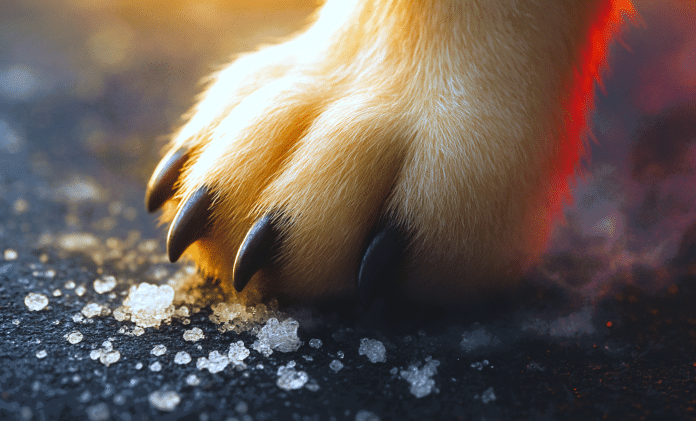Portland, ME – As the first winter snows move across Maine, veterinarians are warning pet owners to take extra precautions during walks. While many focus on keeping pets warm, the greater danger may be underfoot: road salt and chemical de-icers that can burn paws and cause salt toxicity if ingested.
Road salt—typically made from sodium chloride, calcium chloride, or magnesium chloride—can irritate and damage a dog’s paw pads. Sharp crystals can cause cracking or open sores, and when dogs lick their paws afterward, they risk ingesting toxic residue.
Ingesting salt or antifreeze runoff can cause vomiting, diarrhea, excessive thirst, and lethargy, and in severe cases, lead to seizures or kidney failure. Long-term exposure can result in chronic paw damage or internal health issues. Some salt mixtures may also contain heavy metals or industrial contaminants that add further risk.
Veterinarians recommend rinsing a dog’s paws with warm water after every walk and drying them thoroughly to remove residue. Applying a protective paw balm before heading outdoors can help prevent irritation, and trimming the fur between toes keeps salt and snow from collecting. Booties can also provide a reliable barrier for dogs that tolerate them. Pet owners are encouraged to use chloride-free or “paw safe” ice melts around their homes to minimize exposure.
With snow and salt treatments now appearing across Maine, animal care professionals advise owners to watch for limping, licking, or signs of paw discomfort after outdoor activity. They stress that even short walks can lead to irritation if pets are exposed to chemical salt or treated surfaces.
As winter settles in across Portland and beyond, residents are reminded that the biggest cold-weather threat to pets may not be the temperature—but what’s on the ground beneath their paws.





